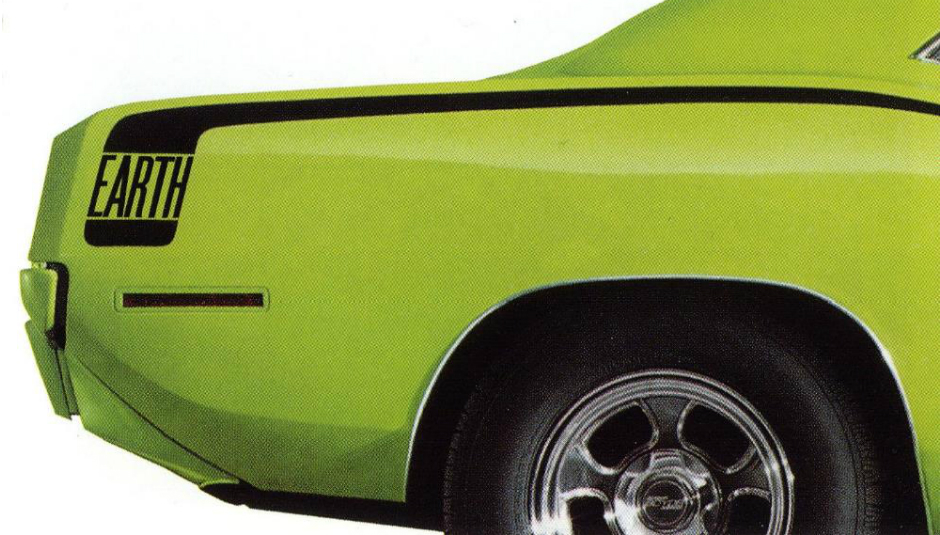The first time I encountered Dylan Carlson’s Earth was through a Sub Pop cassette on Lime Lizard, a short-lived early nineties magazine. The free cover mount tape, a Sub Pop sampler, came with the May 1993 issue - side A included relatively standard US grunge of the time, from bands like the noisy guitar pop of Velocity Girl, Pond, Walkabout, Fastbacks and deranged punk rock band Dwarves. Side 2, however, was entirely taken up with one long track - ‘Seven Angels’ by Olympia, Washington’s Earth from their (just released) album Earth 2. A seething maelstrom of detuned metal-tinged guitars sent a thousand beads of buzzing sound flooding into my teenage skull, a strange familiarity combined with alien fear both drew me in and half repelled me.
I understood from my own early bedroom explorations into drone and noise guitar improvisations where this was coming from, but fitting this music into the context of genre and tribe was a difficult one at the time. I didn’t buy the album, but played the tape to friends as a weird curiosity. It wasn’t until around 1999 that I rediscovered the maximal delights of Earth 2 in all their hallucinatory glory.
Earth’s 1996 album Pentastar: In The Style Of Demons was not so immediate. On first listen it sounded too piecemeal for my liking, and I didn’t understand why you would structure an album this way. The songs felt too straight compared to Earth 2 and the experimental pieces too cold and threadbare, but how wrong I was. My relationship with many of my beloved records start out this way, the initial response unimpressed or just a plain dislike, but these usually turn into an earworm that keeps burying deep until my obsession/possession fully takes hold.
Pentastar: In The Style Of Demons begins and ends with ‘Introduction’ and ‘Coda Maestro in F (Flat) Minor’, both essentially a variation on the same track but with different layerings of phasing organ and glassy guitar leads. By bookending the album this way Carlson draws attention to the endless possibilities that each individual song can take, and although he is essentially a minimalist/maximalist, Carlson also understands the multiple paths any one track can take - time, place, mood and concept are the only constraints.
When it comes to the relatively straightforward songs on Pentastar, they retain a groove like no other Earth LP. In particular, ‘High Command’ and ‘Tallahassee’ give the lava flow of lugubrious guitars a connection to AC/DC, ZZ Top and JJ Cale, but also make me think of Spacemen 3 had they grown up in the state of Washington rather than Rugby. Another rare element to these tracks is Carlson’s laconic vocals, hovering in the distance behind a slack corridor of thick reverb.
This record spaces its different atmospheres equally between song and composition, rarely following the same structure as the last, moving between diametrically opposed surfaces whilst maintaining a focused economy. ‘Crooked Axis For String Quartet’ is the closest piece to anything on Earth 2; a low-end electrical tone unfurls as an indeterminate sound akin to a glass harp cutting across a frozen soundscape. I’ve never been able to identify this sound and I don’t want to know either, for the fear that the spell might be broken.
Carlson has spoken on a number of occasions about the influence of minimalist composer La Monte Young and the music of Terry Riley, which brings us to the most stubborn and obtuse track on the album - ‘Sonar And Depth Charge’, a 7 minute and 14 second repetitive piano figure employing only two notes, doggedly circling the same motif like picking a scab that never heals. More than the greats of US minimalism, this brings to mind the composer Michael Nyman’s piano pieces on Decay Music or outsider musician Jandek.
What striking about this album is how succinct and focused it is. For all its disparate elements, a plethora of textures, atmospheres, and musical genres come together as a cohesive whole to create an album that still surprises and inspires to the present day.
Alexander Tucker's latest solo record Don't Look Away is out 24 August via Thrill Jockey. For more information about his music and work, please click here.






















